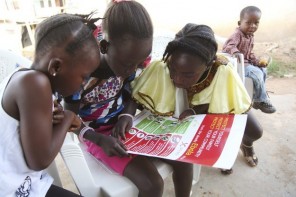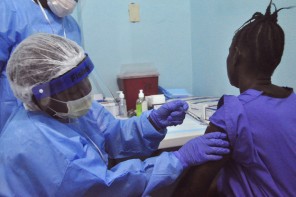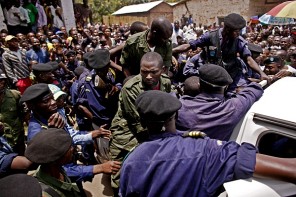In Freetown recently, I came face to face with something that made me a believer: a trash truck.
A believer in what? That depends on what or whom you credit with the appearance of the trash truck. A newly buoyant national government? A streamlined UN better supporting national needs? Aid? Whatever your preferred church of social service causality the point is that I was sitting in Freetown’s legendary traffic, I saw a trash truck.
A picture of a gleaming white sanitation truck will never make it onto a postcard, but it’s possibly the thing most worth writing home about. When I first came here two years ago, Freetown rid itself of trash by collecting it in piles at the end of major (and narrow) streets and burning it. There are still a few major piles to be found at strategic locations, but they’re tended by trucks – and presumably, workers with nifty new jobs – and the trash is taken away.
You may be asking yourself, Is she seriously writing about trash collection? I get that this has the potential to sound a little snotty, as if the recently returned adventure tourist is pleased to see that the natives have finally discovered sanitation. But that would be too cynical a read even for me. And it would be wrong, for reasons that suggest perhaps this whole peacebuilding thing, which I’m here investigating for the Pulitzer Center on Crisis Reporting, has its merits.
Earlier this week, I spoke with Philip Dive, the joint strategy officer at UN country headquarters and, de facto, HQ’s peacebuilding point man. Peacebuilding is a word with as many definitions as people you ask, but Dive’s take sticks out: He thinks of peacebuilding as a process of normalization, of taking situations so abnormal they demand attention – 70 percent of youth are illiterate! – and fixing them so that, basically, they don’t. (Ever read a news story headlined, “Seventy percent of youth can read and write!” Me either.)
Dive doesn’t use “abnormal” normatively. There’s not judgment in it, the same way that my noticing trash collection is not an invocation of the colonial continuum of progress toward civilization. And that’s just the point. When you come to Freetown – which you should, for the beautiful beaches and the delicious food and the people and the fantastic hand-dyed fabrics and expert tailors – you won’t notice the trash collection. Because to you, it’s normal.
Here’s another sign it may be working: When I told a bank teller downtown that I was writing on peacebuilding in Sierra Leone, he cringed. Another reporter looking for the brink-of-war-again story, his face seemed to say.
He told me he works a 12-hour day, with an hour’s commute on either end. He’s busy, and often, he’s tired. “We don’t need anyone to tell us not to go to back to the bush,” he said, cufflinks clinking against the counter as he counted out my leones — doing what bank tellers everywhere do, normally.




I love it. What the Congolese wouldn’t give for trash trucks and bank tellers and literate children and all the other markers of normalcy. There are still people alive who remember it, which is what makes the situation so sad.
That’s one thing I hate about the crisis-journalism lens. It automatically disconnects the reporter from the continuity of a place. It does for me, anyway. You plunk down and need to know about why the 70,000 people left their homes or what’s going on in rape these days or where all the child soldiers are now, and you don’t have time to think about the fact that when the mother had her first kid, the child soldier’s 10-years-elder brother, she probably thought they would all live normal lives. I find it hard to stay connected to that.
In Sierra Leone, it seems to come up more, maybe because there is a visible alternative to chaos, clear signals — and a general street gestalt — that things have turned. So people can talk about the “before” more easily, because they’re in the “after.” It might also be a language thing; I can small talk in English much more freely than in French, and these are the things you learn in the small talk sometimes, too.
Anyway, you’ve clearly got me thinking…